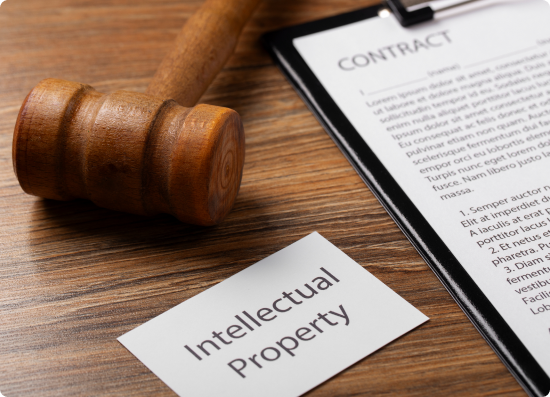Intellectual Property Law
Onal Gallant provides legal services across all areas of intellectual property law, with a focus on trademark registration, copyright protection, licensing agreements, and enforcement of IP rights. The team works with individuals and businesses to safeguard their innovations, brands, and creative works.
Practice Areas
Intellectual Property Law
Protecting and enforcing intellectual property rights.
With years of experience, the team supports entrepreneurs in establishing, operating, and protecting their businesses and assets both in the U.S. and internationally.
Services include advisory, registration, monitoring, oppositions, appeals, enforcement, litigation, and transactional support for all aspects of trademarks and copyrights.

Comprehensive Legal Services
Onal Gallant has provided expert legal counsel to corporate and individual clients in the United States and globally, specializing in trademark registration, protection, and enforcement.

Trademark Application
Assistance with preparing and filing trademark applications to protect brand identity.

International Trademark Prosecution before WIPO
Support with global trademark protection through WIPO and the Madrid System.

Copyright Registration
Registration services to safeguard original creative works under U.S. copyright law.

Licensing Agreements
Drafting and reviewing IP licensing contracts to protect usage rights and revenues.

Dispute Resolution
Resolution of IP conflicts through negotiation, mediation, or administrative proceedings.

Intellectual Property Litigation
Representation in trademark and copyright disputes before courts and tribunals.
Aaron is a managing partner in the firm's Trademark Practice, focusing on registration, enforcement, and brand protection in the U.S. and internationally.
Establish Yourself and Your Business in the U.S. Here
FAQs
Trademark registration legally protects your business name, logo or slogan. It prevents others from using or copying your brand, grants you legal rights and increases the value of your brand.
Trademark registration in the US is handled by the United States Patent and Trademark Office (USPTO).
No, but an unregistered trademark lacks federal legal protection, making it harder to defend your rights if someone else uses a similar mark.
Individuals, businesses, and foreign companies planning to operate in the US can apply. Foreign applicants without a US address must work with a US licensed trademark attorney.
Names, logos, slogans, product designs, and even certain colors or sounds (such as a distinctive sound effect) can be registered.
The trademark registration process starts with a USPTO database search to ensure uniqueness, followed by application submission and examiner review. If approved, the mark enters a publication period for potential objections. If none arise, it is officially registered, and a certificate is issued.
Typically, it takes 9 to 11 months, but the timeline depends on the complexity of the application and potential objections.
A Declaration of Use must be filed between the 5th and 6th year, and a renewal application is required every 10 years.
No, but you can seek international protection through the Madrid Protocol or by filing separate applications in different countries.
No, registering a business name only allows you to operate under that name but does not grant federal trademark protection.
Yes, but until the registration is finalized, you do not receive full legal protection.
Yes, regularly monitor for potential trademark infringements and take legal action if necessary to protect your brand.
It refers to the process of resolving conflicts involving intellectual property—such as infringement or breach of licensing terms—through legal or alternative mechanisms.
Depending on the complexity of the matter, options may include negotiation, mediation, arbitration, or litigation. Consulting an attorney experienced in intellectual property can provide valuable insight and help you make informed decisions throughout the process.
IP litigation involves formal legal proceedings to enforce intellectual property rights, often due to unauthorized use or infringement.
If informal solutions prove ineffective and the violation causes significant harm, legal action may become necessary. Engaging with an attorney early on can help assess the strength of your case and identify the most strategic path forward.
A licensing agreement is a legal contract in which the owner of intellectual property (IP) grants permission to another party to use that IP under defined terms.
A written agreement clarifies the scope of rights granted, the duration, payment terms, and restrictions—protecting both parties and avoiding future disputes.
Copyright registration protects original works of authorship like books, software, music and artwork. It provides legal evidence of ownership and is necessary to file a lawsuit for infringement in the U.S. You can register your copyright through the U.S. Copyright Office.


